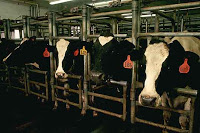A South Dakota bill that changes the way county zoning is done for Confined Animal Feeding Operations (CAFOs) has cleared a State Senate committee. The bill wants to streamline the approval process for permitting large livestock operations. Supporters of the bill believe it keeps South Dakota agriculture competitive and will prevent bureaucratic delays for local approval. Opponents, however, contend the bill removes local control and helps corporate farms push large feedlots into areas where they are not wanted.
Per the Argus Leader, House Bill 1140 would bar appeals of “administrative” or “ministerial” decisions made prior to a hearing on a conditional use permit and let county commissioners make changes to a zoning ordinance without sending it back to planners for review. The bill also gives county commissioners more leeway in rewriting zoning laws. Currently, county commissioners are allowed to only vote yes or no on zoning ordinance rewrites, which first pass through a planning board, usually after months of input from county residents. If HB 1140 becomes law, commissioners can make changes, publish them, and approve a zoning ordinance without further review by county planners.
According to its sponsor, Sioux Falls Republican Rep. Mark Mickelson, the purpose of the bill is to encourage the development of large feedlots on family farms throughout South Dakota. Mickelson contends South Dakota has fallen behind in developing concentrated animal feeding operations, with rural counties losing population as farmers leave for lack of opportunity.
Opponents say the bill goes too far and robs the public of protections provided by zoning regulations. Dean Lockner, a multi-generation rancher, told South Dakota Public Broadcasting, “Without a public notice we would not have known that a 65-thousand head feedlot requested a conditional use permit by our ranch. The manure stack would have been 10 feet high by 20 feet wide almost a mile long each month right across the road. This would have destroyed our quality of life had it been approved.”
The bill passed 6-3 and now moves to the full Senate. If it passes, it will be sent to Gov. Dennis Daugaard for approval or a veto. The House passed it 51-18 on Feb. 16.
A copy of the proposed bill is available here.
